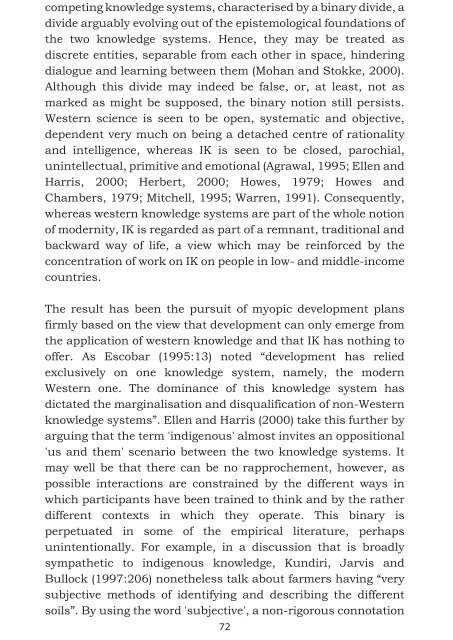Beneficiaries are actors too.pdf - Southern Institute of Peace ...
Beneficiaries are actors too.pdf - Southern Institute of Peace ...
Beneficiaries are actors too.pdf - Southern Institute of Peace ...
You also want an ePaper? Increase the reach of your titles
YUMPU automatically turns print PDFs into web optimized ePapers that Google loves.
competing knowledge systems, characterised by a binary divide, a<br />
divide arguably evolving out <strong>of</strong> the epistemological foundations <strong>of</strong><br />
the two knowledge systems. Hence, they may be treated as<br />
discrete entities, separable from each other in space, hindering<br />
dialogue and learning between them (Mohan and Stokke, 2000).<br />
Although this divide may indeed be false, or, at least, not as<br />
marked as might be supposed, the binary notion still persists.<br />
Western science is seen to be open, systematic and objective,<br />
dependent very much on being a detached centre <strong>of</strong> rationality<br />
and intelligence, whereas IK is seen to be closed, parochial,<br />
unintellectual, primitive and emotional (Agrawal, 1995; Ellen and<br />
Harris, 2000; Herbert, 2000; Howes, 1979; Howes and<br />
Chambers, 1979; Mitchell, 1995; Warren, 1991). Consequently,<br />
whereas western knowledge systems <strong>are</strong> part <strong>of</strong> the whole notion<br />
<strong>of</strong> modernity, IK is regarded as part <strong>of</strong> a remnant, traditional and<br />
backward way <strong>of</strong> life, a view which may be reinforced by the<br />
concentration <strong>of</strong> work on IK on people in low- and middle-income<br />
countries.<br />
The result has been the pursuit <strong>of</strong> myopic development plans<br />
firmly based on the view that development can only emerge from<br />
the application <strong>of</strong> western knowledge and that IK has nothing to<br />
<strong>of</strong>fer. As Escobar (1995:13) noted “development has relied<br />
exclusively on one knowledge system, namely, the modern<br />
Western one. The dominance <strong>of</strong> this knowledge system has<br />
dictated the marginalisation and disqualification <strong>of</strong> non-Western<br />
knowledge systems”. Ellen and Harris (2000) take this further by<br />
arguing that the term 'indigenous' almost invites an oppositional<br />
'us and them' scenario between the two knowledge systems. It<br />
may well be that there can be no rapprochement, however, as<br />
possible interactions <strong>are</strong> constrained by the different ways in<br />
which participants have been trained to think and by the rather<br />
different contexts in which they operate. This binary is<br />
perpetuated in some <strong>of</strong> the empirical literature, perhaps<br />
unintentionally. For example, in a discussion that is broadly<br />
sympathetic to indigenous knowledge, Kundiri, Jarvis and<br />
Bullock (1997:206) nonetheless talk about farmers having “very<br />
subjective methods <strong>of</strong> identifying and describing the different<br />
soils”. By using the word 'subjective', a non-rigorous connotation<br />
72


